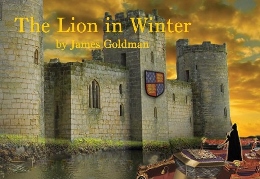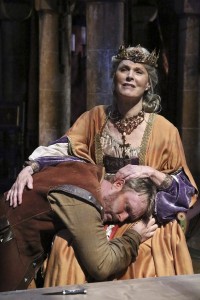A TOOTHLESS LION
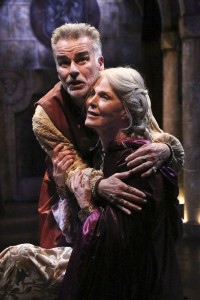 James Goldman’s The Lion in Winter is a brilliant study in castle intrigue laced with deceit and deception, alliances and allegiances, backstabbing and double dealing. The power of the 1966 drama emanates from its uncompromising wit and biting humor. Unfortunately, under the direction of Stephanie Vlahos, The Colony Theater’s production, a muted roar with no bite, arrives toothless and chomp-free. Instead of grabbing patrons by the nape of the neck in its mighty jaw it simply attempts to gum them into submission.
James Goldman’s The Lion in Winter is a brilliant study in castle intrigue laced with deceit and deception, alliances and allegiances, backstabbing and double dealing. The power of the 1966 drama emanates from its uncompromising wit and biting humor. Unfortunately, under the direction of Stephanie Vlahos, The Colony Theater’s production, a muted roar with no bite, arrives toothless and chomp-free. Instead of grabbing patrons by the nape of the neck in its mighty jaw it simply attempts to gum them into submission.
The year is 1183 and England’s King Henry II has summoned his wife, Eleanor of Aquitaine, from her imprisoned exile to his castle at Chinon for a Christmastime family reunion. The whole brood is present for the festivities and everyone has their own agenda and ulterior motives. Henry wants to maintain his strength and prevent his power from transferring to Eleanor or their three sons: Richard the Lionhearted, Geoffrey, Count of Brittany, and the youngest of their spawn, the feebleminded and clueless John. Eleanor wants her freedom and power back, and the boys all want to be king.
Joining in the fun is Phillip II, King of France, who not only happens to be the son of Eleanor’s ex-husband but the stepbrother to Alais, who was betrothed to Richard in youth, raised as a daughter by Eleanor, and is now Henry’s mistress. Oh, what a tangled web we weave. Let the plotting, manipulation, and betrayal begin.
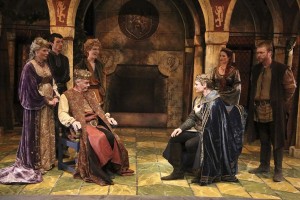 While fictional, Mr. Goldman’s script is based on true-life Henry Plantagenet and clan, and has become a historical soap opera for the ages, accessible to all. While passed over for a Tony Award (Rosemary Harris won Best Actress playing Eleanor), his screenplay adaptation won the Oscar in 1968 (as did Katherine Hepburn in a famous tie with Barbra Streisand for Funny Girl). It is populated with some of the best one-liners, retorts, and go-for-the-juggler zingers ever written, elevating familial bickering to a new high. Goldman proves that no one knows how to destroy your psyche and bring you to your knees better or faster than your loved ones.
While fictional, Mr. Goldman’s script is based on true-life Henry Plantagenet and clan, and has become a historical soap opera for the ages, accessible to all. While passed over for a Tony Award (Rosemary Harris won Best Actress playing Eleanor), his screenplay adaptation won the Oscar in 1968 (as did Katherine Hepburn in a famous tie with Barbra Streisand for Funny Girl). It is populated with some of the best one-liners, retorts, and go-for-the-juggler zingers ever written, elevating familial bickering to a new high. Goldman proves that no one knows how to destroy your psyche and bring you to your knees better or faster than your loved ones.
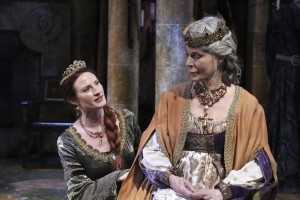 Ms. Vlahos has taken the bulk of the humor and tossed it into the Thames in favor of a heavy-handed dramatic approach. Off-the-cuff scathingly funny dialogue is treated with the reverence of Bible scriptures. All the lines are given much more weight than they deserve and ultimately sink the proceedings. Further exacerbating the problem, the actors often pause in the middle of a punch line completely negating the joke. With over-the-top melodramatic performances, the overblown bouts of emotion look ridiculous; as the drama builds in Act II it becomes at times laughable to watch.
Ms. Vlahos has taken the bulk of the humor and tossed it into the Thames in favor of a heavy-handed dramatic approach. Off-the-cuff scathingly funny dialogue is treated with the reverence of Bible scriptures. All the lines are given much more weight than they deserve and ultimately sink the proceedings. Further exacerbating the problem, the actors often pause in the middle of a punch line completely negating the joke. With over-the-top melodramatic performances, the overblown bouts of emotion look ridiculous; as the drama builds in Act II it becomes at times laughable to watch.
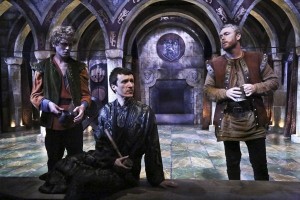 Even so, some of the actors manage to pull off halfway decent performances. Of the group, Mariette Hartley fares the best; she imbues Eleanor with just the right mix of humanity and ruthlessness – although she was a bit shaky on her lines and had to back-peddle on several occasions when she would begin the wrong line and have to correct herself. Conversely, Ian Buchanan’s Henry is all bluster and pomposity, lacking any sense of subtlety. When in doubt – yell. His Act II breakdown is cringe worthy. Ms. Vlahos should have been more protective of him. At no point do you believe Henry and Eleanor were ever married or in love, which only serves to further distance the audience from the inherent humor of their repartee.
Even so, some of the actors manage to pull off halfway decent performances. Of the group, Mariette Hartley fares the best; she imbues Eleanor with just the right mix of humanity and ruthlessness – although she was a bit shaky on her lines and had to back-peddle on several occasions when she would begin the wrong line and have to correct herself. Conversely, Ian Buchanan’s Henry is all bluster and pomposity, lacking any sense of subtlety. When in doubt – yell. His Act II breakdown is cringe worthy. Ms. Vlahos should have been more protective of him. At no point do you believe Henry and Eleanor were ever married or in love, which only serves to further distance the audience from the inherent humor of their repartee.
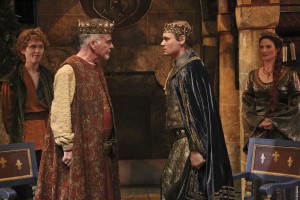 As Richard, Brendan Ford is a formidable presence very committed to his resolve, although he wouldn’t know a laugh line if it hit him in the face. He at least makes an effort to layer his portrayal and remain grounded, never entering the realm of scenery chewing. Paul Turbiac’s Geoffrey is centered but a bit on the bland side, and Doug Platt’s John is a bit too much Harpo Marx. Paul David Story is quite good as the conniving King of France but Justine Hartley peppers her portrayal of Alais with way too much intensity and angst, thus blowing the simplest of lines way out of proportion. Once again, Ms. Vlahos should have had her back.
As Richard, Brendan Ford is a formidable presence very committed to his resolve, although he wouldn’t know a laugh line if it hit him in the face. He at least makes an effort to layer his portrayal and remain grounded, never entering the realm of scenery chewing. Paul Turbiac’s Geoffrey is centered but a bit on the bland side, and Doug Platt’s John is a bit too much Harpo Marx. Paul David Story is quite good as the conniving King of France but Justine Hartley peppers her portrayal of Alais with way too much intensity and angst, thus blowing the simplest of lines way out of proportion. Once again, Ms. Vlahos should have had her back.
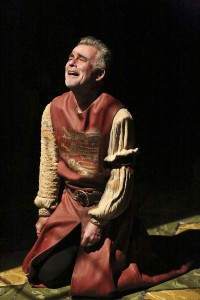 David Potts’ scenic design is quite good and his use of sliding tapestries is excellent in delineating different areas. Jared A. Sayeg painstakingly incorporates historically accurate wall torches on the set and uses candlelight to set the mood, but his use of up-lighting at the base of the columns – in view to the audience – is questionable: It’s pretty to look at and casts wonderful shadows but there was no electricity in the 12th century so it’s completely out of place. Kate Bergh’s costumes are fitting if not a bit clean for the era; Henry and John’s duds seem like they were lifted off the rack from a production of Spamalot.
David Potts’ scenic design is quite good and his use of sliding tapestries is excellent in delineating different areas. Jared A. Sayeg painstakingly incorporates historically accurate wall torches on the set and uses candlelight to set the mood, but his use of up-lighting at the base of the columns – in view to the audience – is questionable: It’s pretty to look at and casts wonderful shadows but there was no electricity in the 12th century so it’s completely out of place. Kate Bergh’s costumes are fitting if not a bit clean for the era; Henry and John’s duds seem like they were lifted off the rack from a production of Spamalot.
If you are a fan of Mr. Goldman’s words they will be totally lost to you here. Might I suggest you stay home and watch the movie instead? As in the play, Henry (played by Peter O’Toole), states: “The day those stout hearts band together is the day that pigs get wings.” Watch the way Katherine Hepburn responds with “There’ll be pork in the treetops come morning.” Now, that’s comedy that sinks its teeth into you.
The Lion in Winter
The Colony Theatre
555 N. Third St in Burbank
scheduled to end on May 18, 2014
for tickets, call 818/558-7000 ext. 15 or visit www.ColonyTheatre.org
